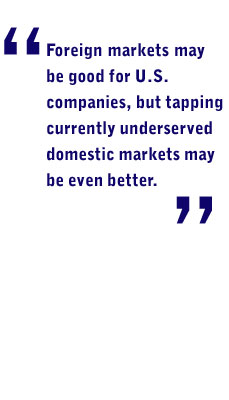


Minority Buying Power Skyrockets
By Randolph Fillmore

![]()
When Data Talk, Marketers Listen

Researchers at the University of Georgia have found that the buying power of Hispanics, African Americans, Asian Americans and Native Americans has skyrocketed in the United States since 1990 — and they see the trend continuing, with Hispanic buyers leading the charge in 2007.
The annual report of the Selig Center for Economic Growth, based in UGA’s Terry College of Business, first came out in 1990 as an estimate of minority buying power in the state of Georgia, recalled Selig Center director Jeff Humphreys. “Today it’s a much larger national overview that fills a vacuum both for marketing professionals and economists,” he said. The Center’s most recent report, published in fall 2006, includes state-by-state estimates for 1990 through 2006 and projections through 2011 for the nation’s largest ethnic groups.
Changes over the past 16 years have been considerable, according to the report. “In 1990, the Georgia Hispanic market ranked 19th nationwide,” said Humphreys. “By the end of 2006, Georgia had become the 10th largest Hispanic market in the U.S., spending at a record $12.4 billion.”
This change mirrors what is happening in the rest of the country, where Hispanic spending will have increased by an estimated 457 percent between 1990 and 2011.

Humphreys notes that 2007 will mark the first year that Hispanics will control more disposable personal income that any other U.S. minority group. And he suggests that young Hispanics, although geographically concentrated in 10 states, will be setting trends for young people across all ethnic groups — and that the trends they set will cross over into the mass market.
The report also documents new buying power wielded by Asian Americans, who, not far behind Hispanics, have the second-fastest rate of economic growth in the nation. “Asian-American buying power is estimated to grow by 434 percent from 1990 to 2011,” said Humphreys. “In 2000, six states demonstrated more than $10 billion in Asian American buying power. By 2011, 14 states will reach that benchmark.”
Even Native Americans, the smallest minority, have posted rapid growth in their buying power, spending $53.9 billion in 2006 — a mark expected to rise to $73 billion by 2011.
Meanwhile, African Americans still topped minority spending in 2006. While their consumer power is more geographically dispersed than that of Hispanics or Asian Americans, it’s large enough to represent a significant segment in many states, including Georgia, where blacks spent $54.4 billion in 2006. Other states with African American consumer markets estimated at greater than $50 billion in 2006 include New York, Texas, California and Florida, noted Humphreys.
These and other data from the Selig Center annual report are enjoying especially high utility in the past few years. “The 2000 U.S. census documented the growth in minority populations and served as a wake-up call about marketing directly to minority consumers,” said Humphreys. “Now, because many companies are playing catch-up when it comes to marketing to minority groups, and because minority markets are often underserved, our report has become useful for strategic planning.”
The nature of such planning is crystal clear to Humphreys. “Anyone considering investing time or money in marketing or in product development needs to recognize the growing importance of our multi-cultural economy,” he concluded. “One need not look overseas to find fast-paced growth. An increasingly multi-cultural domestic market offers the benefits of fast-paced growth without the risks of foreign markets.”
The Selig Center’s report, “The Multicultural Economy: Minority Buying Power in the New Century,” is a 204-page book and CD package.
For more information contact Jeff Humphreys at jhumphreys@terry.uga.edu or access http://www.selig.uga.edu.
For comments or for information please e-mail: rcomm@uga.edu
To contact the webmaster please email: ovprweb@uga.edu
![]()